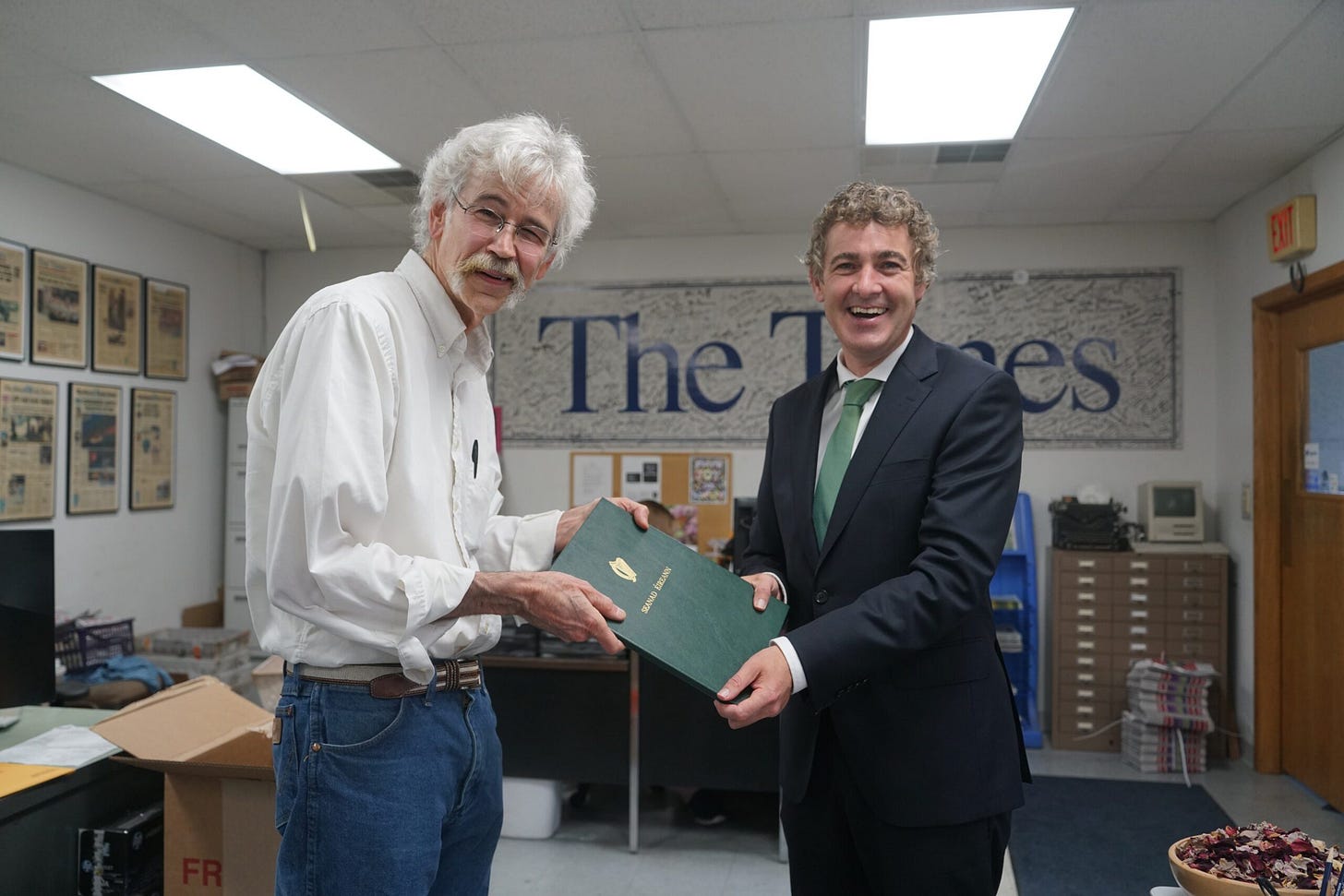Senator Mark Daly presents the proclamation from the Irish Senate congratulating The Storm Lake Times for winning the Pulitzer Prize for editorial writing in 2017.
(Art Cullen is editor of the Storm Lake Times Pilot, where this column appeared. Please consider a subscription for local commentary like this. Thanks.)
I was brought to tears last Friday when the chair of the Irish Senate, Mark Daly of Kerry, popped in to the Storm Lake Times Pilot office to present us a proclamation passed by the upper chamber in 2018 congratulating us on winning the Pulitzer Prize for editorial writing.
He would have done it sooner, but Daly explained he is operating on Irish time.
It’s difficult to describe how overwhelmed brother John and I are. Suffice to say that a huge picture signed by JFK is right above the copying machine. It’s who we are. Still, it blows our minds to think that the Irish Senate cared about a couple of country editors in Iowa.
They take their writing and politics seriously. Daly, 49, quotes WB Yeats to explain just about anything and Daniel Patrick Moynihan on summing it all up: “To be Irish is to know that in the end the world will break your heart.”
In that vein we took it with a laugh when Sen. Mark Segebart and his Republican caucus snuffed a resolution in the Iowa Senate offered by Senators Liz Mathis and David Johnson citing us for the Pulitzer. It was wrapped up in the politics of the Des Moines Water Works lawsuit, and scuttling the resolution shows how silly politics can be.
Daly caught wind of it and took up the cause, passing the resolution through the Irish Senate in a breeze because we were Irish American. They also take the diaspora seriously. The United States is the only nation mentioned in the Irish independence proclamation of 1916 for the support of “our exiled children in America.”
“If your own state doesn’t stand with you, know that an entire nation does,” Daly told me four years ago. Knock me out of my chair.
Daly showed up in Storm Lake on Thursday after flying into Omaha and visiting Pisgah, where his great uncle was a priest sent by the Irish bishops to the Lutheran stronghold to pastor the local exiled children. The senator was visiting the U.S. to drum up support for the Irish American Legislators Caucus, which held a meeting in Denver.
“Because we were denied our rights for 850 years, the Irish are a political people. It becomes part of your DNA — to stand up and change what is happening,” Daly said. “The Irish who came to America in three generations went from being cops to lawyers to judges. The Kennedys in three generations went from famine refugees to President of the United States.
“In America, they had the power to elect their own people for their community.”
The proclamation presented to Art Cullen.
Because of it, the U.S. was able to prod Great Britain on the Irish occupation. President Clinton and special envoy George Mitchell brokered the Good Friday Agreement that brought a truce between warring Catholic and Protestant factions in Northern Ireland.
“Many people are alive today because of the Clinton and Bush Administrations, and subsequent, supporting the Good Friday accord,” Daly said.
It is threatened by Brexit, as Ireland is torn between Great Britain and Europe. Daly counts on the United States to bring its goodwill to bear. Peace is at stake.
“The next 10 years will determine our next 100,” Daly told me.
The U.S.-Irish relationship is a “deep-heart’s core issue with us,” Daly said, quoting Yeats.
Obviously, it’s a quintessential American immigration story. Starved out by the British, the Emerald Isle was vacated principally to the U.S. in the 1800s. Our ancestors came up the Mississippi from New Orleans to Dubuque and eventually came west to Kossuth and Palo Alto counties. The stories are legion of Irish dying digging the New Orleans canals. After the Potato Famine, a quarter of New York City were Irish refugees.
“They didn’t have it easy,” he said. Our people were indentured servants, Illinois conscripts in the Winnebago War and railroad gandy dancers trying to earn a patch of ground.
Other than that they were masters of English, the Irish are little different from Guatemalan refugees in Storm Lake today.
“The luck of the Irish is that they ended up at the top of the most powerful country on Earth,” Daly said.
New immigrant communities need leaders who can mobilize people for their rights, he suggests, and for their home countries. They’re starting — Salvadoran Emilia Marroquin of Storm Lake was just named to the Iowa Latino Hall of Fame.
“America is still the place where hope and history can rhyme,” Daly said. “Look at the opportunity that doesn’t exist for 90% of the planet that does exist here. The man on the hill is not in charge of your destiny.”
They say these Kerrymen are charmers, and there you have it.
I’ve never been over the pond. Next August, the Irish Senate will mark its 100th anniversary with the largest delegation of elected American officials ever to gather in Ireland, rounded up from places like Schleswig by Daly. Maybe I can get there to express our thanks.
“History says don’t hope
On this side of the grave.
But then, once in a lifetime
The longed for tidal wave
Of justice can rise up
And hope and history rhyme.”
— Seamus Heaney





During these times, we need more than hope—a favorite verse on hope: Hope is not a feeling of certainty that everything ends well. Hope is just a feeling that life and work have a meaning.” ― Vaclav Havel. While I am not Irish, I married a County Donegal woman. And we did honeymoon in the Republic. Great poem, nonetheless